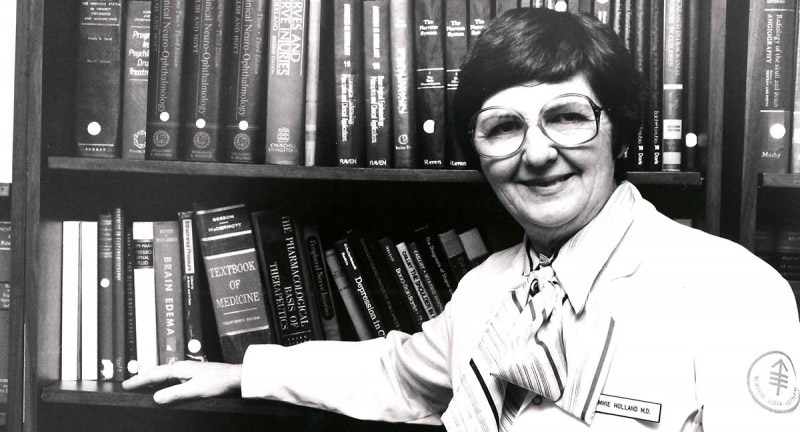Baylor alumna was among the first to treat cancer patients’ emotional needs

Today, it’s a given that patients with catastrophic illnesses like cancer need help with both their physical problems and their emotional distresses as they fight their illness. This is the story of the Baylor alumna who helped make that the standard: Dr. Jimmie Holland, Class of 1948.
As a doctor at New York’s Memorial Sloan Kettering (MSK) Cancer Center in the mid 1970s, Holland — who recently passed away at age 89 — pioneered the field of psycho-oncology, giving patients the liberty to explore how they felt about fighting for their life against disease. At MSK, she established the first full-time psychiatry service in a major cancer hospital and founded the American Psychosocial Oncology Society — just two of the incredible achievements for which she will be remembered.
Even as a young girl, Holland loved science and medicine, dreaming of being a doctor. Born to high school dropouts in a small farming community east of Dallas, she found her way to Baylor, where she majored in zoology and minored in chemistry and German. Here, she was an active leader in pre-med and biology honor societies, and even found time to play violin with the Baylor Symphony. It was also at Baylor that she found a mentor in Dr. Cornelia Marschall Smith, BA ’18, then chair of the biology department. Upon graduating, she headed to Baylor College of Medicine — one of only three women in a class of 80-90 men — and earned her doctorate in 1952.
Holland’s interest in psychiatry was driven by both her personal and medical experience. When she was 9 years old, an uncle was institutionalized for a mental breakdown, and when she was 27, her first husband committed suicide. During her residency at Massachusetts General Hospital, in the midst of a polio epidemic, Holland was inspired to study how humans deal with catastrophic illness — and thus, her psychiatry career officially begun.
After her residency, Holland moved to New York, where she met and married Dr. James F. Holland, a chemotherapy specialist. She would talk with her husband about his clinical trial work fighting cancer and leukemia, taking a specific interest in how patients felt about being in a trial. As a result, the Hollands conducted the first-ever quality-of-life study on his trial participants.
Dr. Jimmie Holland challenged what she called “the tyranny of positive thinking” regarding cancer. “It’s bad enough to have cancer,” she said, “but when all of your family and friends are saying that you have to be positive and you have to fight this thing, and the patient is exhausted and beaten up by the treatments — it seemed to me that adding that burden to be positive was just ridiculous.”
In 1977, Holland started what would become the Department of Psychiatry at Memorial Sloan Kettering Cancer Center, the world’s oldest and largest private cancer center. There, she became the first woman to head a clinical department, created the first full-time psychiatry service in a major cancer hospital, and conducted some of the first studies of the psychological impact of cancer on patients and their families. Her work and research in New York put the field of psycho-oncology on the medical map, and she established the American Psychosocial Oncology Society (as well as the International Psycho-Oncology Society) to encourage a “whole-person” approach to cancer care.
“For more than 40 years, Jimmie made an essential question — ‘How do people with cancer feel?’ — the center of her work,” says her husband, James. Following her passing, experts and friends alike have noted that the impact of Holland’s work has just begun — and that the societal impact of what this loving, humble, extraordinary woman built will continue to evolve and expand for decades to come.
Sic ’em, Dr. Holland, for your lifetime of service to cancer patients!

